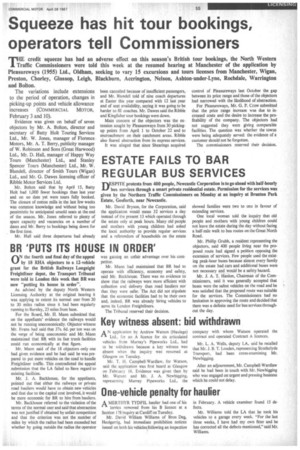BR 'PUTS ITS HOUSE IN ORDER'
Page 57

If you've noticed an error in this article please click here to report it so we can fix it.
ON the fourth and final day of the appeal by 18 RHA objectors to a 12-vehicle grant for the British Railways Longsight Freightliner depot, the Transport Tribunal were told in London this week that BR was now "putting its house in order".
As advised by the deputy North Western Licensing Authority at the original hearing it was applying to extent its normal user from 20 to 30 miles radius since it had been regularly running to Burnley, 23 miles from base.
For the Board, Mr. H. Mann submitted that on the appellants' evidence the railways would not be running uneconomically. Objector witness Mr. Evans had said that 37s. 6d. per ton was on the verge of being uneconomic and Mr. Mann maintained that BR with its fast trunk facilities could run economically at that figure.
Mr. Mann said of the 18 objectors only one had given evidence and he had said he was prepared to put more vehicles on the road to handle Freightliner traffic. This contradicted the appeal submission that the LA failed to Wave regard to existing facilities.
Mr. J. A. Backhouse, for the appellants, pointed out that either the railways or private road hauliers would have to obtain new vehicles and that due to the capital cost involved, it would be more economic for BR to hire from hauliers.
Mr. Backhouse referred to the violation of the terms of the normal user and said that abstraction was not justified if obtained by unfair competition and that the criterion was not the number of miles by which the radius had been exceeded but whether by going outside the radius the operator was gaining an unfair advantage over his competitor.
Mr. Mann had maintained that BR had to operate with efficiency, economy and safety, said Mr. Backhouse. There was no evidence to show that the railways were more efficient with collection and delivery than road hauliers nor that they were safer. The Act did not stipulate that the economic facilities had to be their own and, indeed. BR was already hiring vehicles to serve its London Freightliners.
The Tribunal reserved their decision.
















































































































































































